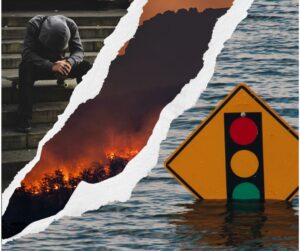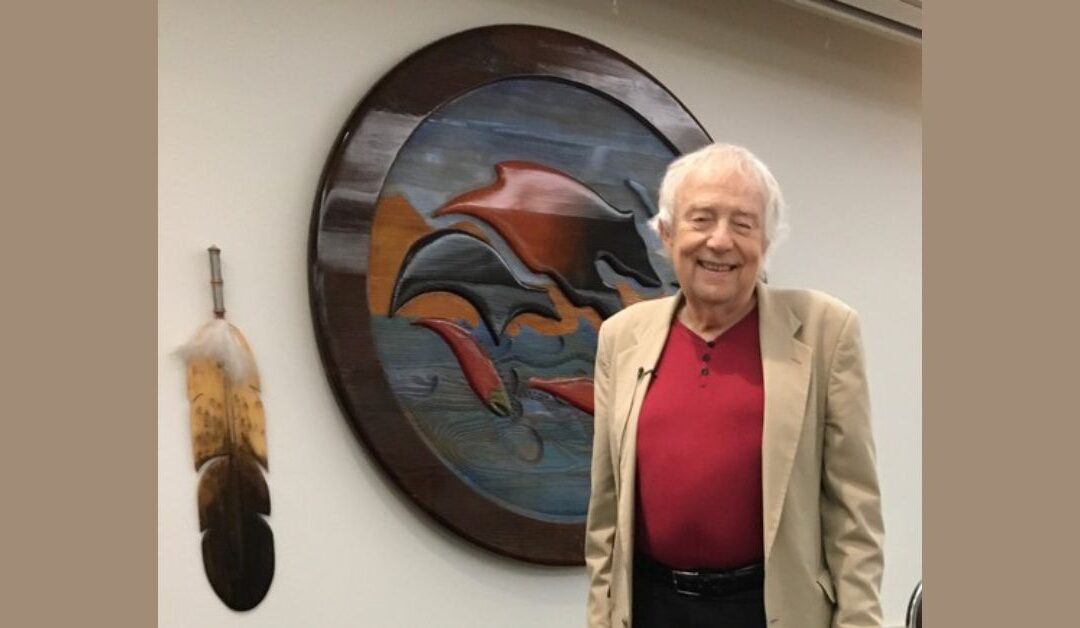Responding to the Climate Crisis – Collaboration, Caring and Community
By Arden Henley
Based on a talk given by the author and Ingrid Kastens at the Annual Conference of the Federation of Community Social Services of BC. The conference was held on June 15, 2023 at the Spirit Ridge at NK’MIP resort in Osoyoos, BC
Introduction:
The climate crisis is an opportunity for those of us who care deeply about the welfare of others and our beautiful earth to make a significant difference. It can truly be our finest hour and the finest hour for the values that we cherish in common. Values of collaboration, caring and community. Exemplifying these values will give us the strength and resilience to see us through to a new world.
 It is true that the starting point in responding to the climate crisis is difficult to hear and to accept. Though it is tempting to carry on as if the profound changes in our world brought about by climate change may happen at some point in the future, climate change is already with us. We can see this in extreme weather events such as heat domes, fires and flooding. And it will continue to be with us with more frequency and greater intensity. We need to begin by recognizing where we are and what is happening.
It is true that the starting point in responding to the climate crisis is difficult to hear and to accept. Though it is tempting to carry on as if the profound changes in our world brought about by climate change may happen at some point in the future, climate change is already with us. We can see this in extreme weather events such as heat domes, fires and flooding. And it will continue to be with us with more frequency and greater intensity. We need to begin by recognizing where we are and what is happening.
The climate change as a reality message is very clearly conveyed by the March, 2023 Synthesis Report from the United Nations’ Intergovernmental Panel on Climate Change (IPCC). Drawing on the findings of 234 scientists on the physical science of climate change, 270 scientists on impacts, adaptation and vulnerability to climate change, and 278 scientists on climate change mitigation, the IPCC Synthesis Report provides the most comprehensive, best available scientific assessment of the current state of climate change.
For the first time, this report also speaks to the profound social disruption that will result. Such as the destruction of homes, the loss of livelihoods and the fragmentation of communities, as well as the associated mental health effects that we know such changes bring about.
Here are the major findings:
1. Human-induced global warming of 1.1 degrees C has spurred changes to the Earth’s climate that are unprecedented in the recent history of the planet.
Already, with 1.1 degrees C (2 degrees F) of global temperature rise, changes to the climate system that are unparalleled over centuries to millennia are now occurring in every region of the world. For example, rising sea levels, more extreme weather events, and rapidly disappearing sea ice.
2. Climate impacts on people and ecosystems are more widespread and severe than expected, and future risks will escalate rapidly with every fraction of a degree of warming.
For example, since 2008, extreme floods and storms have forced over 20 million people from their homes every year.
3. Adaptation measures can effectively build resilience, but more financing is needed to scale solutions.
Measures to build resilience are still largely small-scale, reactive and incremental. And most are focusing on immediate impacts or near-term risks.
4. Some climate impacts are already so severe they cannot be adapted to, leading to loss and damage.
Around the world, highly vulnerable people and ecosystems are already struggling to adapt to climate change impacts. Effective adaptation measures exist for some of these impacts, but economic, political and social obstacles constrain implementation. Obstacles such as lack of technical support or inadequate funding.
5. Global warming emissions may reach in 1.5 degrees C before 2025.
To limit global warming to 1.5 degrees C or less, Green House Gas (GHG) emissions must peak before 2025 at the latest. Then, they must drop rapidly, declining 43% by 2030 and 60% by 2035, relative to 2019 levels. Current commitments will result in a 7% rather than 43% reduction.
6. The world must rapidly shift away from burning fossil fuels — the number one cause of the climate crisis.
A mix of strategies can help avoid locking in these emissions. These include retiring existing fossil fuel infrastructure, canceling new projects, and retrofitting fossil-fueled power plants with carbon capture and storage (CCS) technologies. Also included are scaling up renewable energy sources like solar and wind (which are now cheaper than fossil fuels in many regions).
7. We also need urgent, systemwide transformations to secure a net-zero, climate-resilient future.
While fossil fuels are the number one source of GHG emissions, deep emission cuts are necessary across all of society to combat the climate crisis.
8. Carbon removal or drawing down carbon is now essential to limit global temperature rise to 1.5 degrees C.
All pathways that limit warming to 1.5 degrees C depend on some quantity of carbon removal. These approaches encompass both natural solutions, such as sequestering and storing carbon in trees and soil, as well as more nascent carbon sequestering technologies that pull carbon dioxide directly from the air.
9. Climate finance for both mitigation and adaptation must increase dramatically this decade.
Public and private financing for fossil fuels today far surpasses those directed toward climate mitigation and adaptation.
10. Climate change — as well as our collective efforts to adapt to and mitigate it — will exacerbate inequity should we fail to ensure a just transition.
Or climate change is a social justice issue. Households with incomes in the top 10%, including a relatively large share in developed countries, emit upwards of 45% of the world’s GHGs. Meanwhile, those families earning in the bottom 50% account for 15%. Yet the effects of climate change already — and will continue to — hit poorer, historically marginalized communities the hardest.
Conclusion:

Ingrid Kastens and Arden Henley
At the same time, at a recent event held by the Canadian Society of Physician Leaders in Vancouver, Musqueam elder, Doris Fox told me: the Change has Begun.
“My grandfather who lived to 115 years old told me: I will not live to see the Change, but you will. And I see the Change.”
And seeing the world through her eyes, I saw the Change. In the midst of a room of Canada’s leading medical professionals, the Surgeon General, the President of the Canadian Medical Association. I saw the Change. Earnest conversations at table after table about how we can turn away from loss and despair, from waste and indulgence and find a new way together. This conversation is now going on everywhere. I think Joanna Macy would call this active hope.
Read articles on climate change, sustainability, education, and more from GTEC’s Communication & Media (formally GTEC Blog)!

